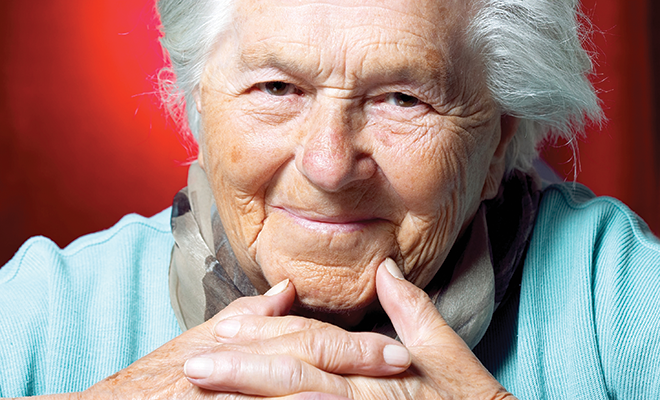
Common Myths About Aging
My late 108-year-old grandma used to lovingly joke, “Tease me about my age and I will beat you with my cane!” Always good for a laugh and a hug, Grandma never identified with her advancing age over the years.
When she was sliding into the home stretch of her youthful 90s, she was asked by a kind young parishioner at her church, “Would you be interested in the services of Meals on Wheels?” Without missing a beat, Grandma replied, “Nope! I don’t have time to volunteer!” She went about her busy day with the same tenacity and ambition she had when she was years younger. She never consulted her mind about how old she was because she wouldn’t believe it anyway.
It’s true that what we think will happen, happens, and as we age, we tend to become what we think we will become. If we think we’re tired, overweight and worn out, that’s what we will most likely become. The Journal of the American Medical Association suggests seniors with a positive bias are 44 percent more likely to recover from a bout of disability. It is important to remain upbeat and optimistic, embracing the will to live; when those forces are in place, the prognosis, no matter the diagnosis, typically improves. Conversely, those who think negatively and expect the worst usually have the outcome they anticipate.
When we think about getting older, the images we have seen through various media platforms usually make us think of slowing down, napping in a rocking chair, and even possessing a somewhat negative and cranky personality. That’s not necessarily true. Regardless, misconceptions about aging and the elderly are prevalent. Here are a few of the top myths about aging and their rebuttals.
Every older person is the same. In reality, this segment of the population demonstrates far more variety than any other age group. They have a wealth of experiences that set them apart and demonstrate diverse stories and backgrounds.
More than 50 percent suffer memory loss, disorientation and strange behaviors. Roughly 80 percent of older adults are fully capable of carrying out their normal day-to-day activities.
Most older adults are unproductive. Even though they may not be fully employed at this stage in life, seniors have much to offer and are often found giving of their time in volunteer roles, as caregivers to others, taking care of grandchildren and staying involved with a variety of civic and social activities.
As people age, they are unable to learn as effectively as in the past. Not all older people shy away from technology. In fact, many embrace it and love to learn new things. Yes, learning patterns do change over time and the speed of learning may diminish as one grows older, but the basic capacity to learn remains intact.
Older people just sit around and watch television all day. Older adults have a wide range of interests and actually sleep fewer hours per day than their younger counterparts.
Most older people live in nursing homes and are incapable of getting around by themselves. You never rode in the car with my grandma when she was 100! In reality, only about five percent of older adults reside in nursing homes and most are highly mobile.
Older adults who continue to work are inefficient and miss multiple work days because of illness. Older adults typically tend to be extremely productive and are rarely late or absent. They possess a work ethic honed by many years of experience.
Older adults are always lonely, isolated and depressed. When older adults have families and friends nearby and interact regularly with them, they are far more likely to be satisfied with their lives.
The aging population suffers from a variety of diseases and disorders that limit their ability to do what they want to do in life. It’s all in the mindset. My grandma lived a fit, active and healthy lifestyle and hardly took a pill in her life. She could outwalk and outpace people half her age. Many senior citizens are in far better shape than the younger crowd.
Certainly there are many negative attitudes about adults over the age of 65, but most of these are purely based on stereotypes and myths. We may realize a loss of function to a degree when we get older, but there is so much we can do to prevent that or at least slow it down when it comes to how we age both physically and mentally. Regular physical exercise helps to retain muscle and encourage bone integrity. It is equally important to exercise the brain, too, by continuously learning new things. ■
Sources: agingcare.com, seniorplanet.org and psychologytoday.com.







